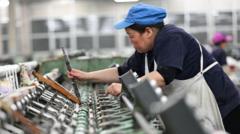As the National People's Congress convenes, leaders emphasize boosting domestic consumption amid global economic uncertainties and increasing trade tensions.
China Aims for 5% Growth Amidst Economic Challenges and Trade Tariffs

China Aims for 5% Growth Amidst Economic Challenges and Trade Tariffs
The Chinese government sets its economic growth target at 5% for 2023, committing billions to combat the impact of US tariffs.
In a bold move reflecting its adaptation to economic headwinds, China has declared an economic growth target of "around 5%" for the current year. This announcement comes alongside a pledge to inject billions of dollars into the struggling economy, which has been further pressured by escalating trade tensions with the United States. China's National People's Congress, often seen as a platform where pre-decided policies are ratified, is closely watched this year due to the unique challenges the nation faces.
Chinese President Xi Jinping is navigating through not only low consumption and a troubled property market but also the repercussions of tariffs imposed during the Trump administration. A recent 10% tariff has been introduced, bringing the total US levy on Chinese imports to 20% and impacting exports—historically a strong element of China's economy.
In response, China swiftly retaliated with its own tariffs on American agricultural goods, vital inputs for its markets. The gathering in Beijing, commonly referred to as the "Two Sessions," has underscored the government's shift towards relying on domestic consumption as the backbone of growth moving forward.
Despite successful targets in previous years, experts suggest achieving this new goal may prove challenging due to the potential reduction in exports caused by sustained tariffs. Analysts estimate a significant decline in Chinese exports to the US, possibly between 25% and 33%, meaning that boosting domestic demand is essential.
In his address, Premier Li Qiang recognized the sluggish nature of household consumption, promising to implement strategies aimed at stimulating spending among ordinary citizens. Recent government initiatives aimed at encouraging consumerism include incentives for trading in older household possessions.
To support these measures, the government plans to issue special treasury bonds valued at 1.3 trillion yuan ($179 billion) while increasing local government borrowing margins. Deficit levels have also been raised, signaling a commitment to fostering economic growth. Moreover, job creation initiatives aiming for 12 million positions are placed in line with established urban unemployment targets.
Even with these economic strategies, skepticism remains high among the populace due to restrictive pandemic policies and an unsettled real estate market. Many citizens prioritize savings due to a lack of a robust social safety net, which complicates the government's consumption-boosting efforts.
Not all is bleak, as government officials emphasize the country's economic stability and latent potential. Investment in "high-quality development" focusing on technological advancements, including renewable energy and artificial intelligence, is expected to remain a focal point of economic policy. The nation's aspiration to be a global technological leader may bolster growth, despite the prevailing uncertainties posed by US tariffs.
The last announcement made during this Congress included a 7.2% increase in China's national defense budget, which reflects ongoing priorities amidst a complex economic landscape. As China adjusts its policies, the ongoing global economic landscape, characterized by protectionism, will play a crucial role in shaping its future growth trajectory.
Chinese President Xi Jinping is navigating through not only low consumption and a troubled property market but also the repercussions of tariffs imposed during the Trump administration. A recent 10% tariff has been introduced, bringing the total US levy on Chinese imports to 20% and impacting exports—historically a strong element of China's economy.
In response, China swiftly retaliated with its own tariffs on American agricultural goods, vital inputs for its markets. The gathering in Beijing, commonly referred to as the "Two Sessions," has underscored the government's shift towards relying on domestic consumption as the backbone of growth moving forward.
Despite successful targets in previous years, experts suggest achieving this new goal may prove challenging due to the potential reduction in exports caused by sustained tariffs. Analysts estimate a significant decline in Chinese exports to the US, possibly between 25% and 33%, meaning that boosting domestic demand is essential.
In his address, Premier Li Qiang recognized the sluggish nature of household consumption, promising to implement strategies aimed at stimulating spending among ordinary citizens. Recent government initiatives aimed at encouraging consumerism include incentives for trading in older household possessions.
To support these measures, the government plans to issue special treasury bonds valued at 1.3 trillion yuan ($179 billion) while increasing local government borrowing margins. Deficit levels have also been raised, signaling a commitment to fostering economic growth. Moreover, job creation initiatives aiming for 12 million positions are placed in line with established urban unemployment targets.
Even with these economic strategies, skepticism remains high among the populace due to restrictive pandemic policies and an unsettled real estate market. Many citizens prioritize savings due to a lack of a robust social safety net, which complicates the government's consumption-boosting efforts.
Not all is bleak, as government officials emphasize the country's economic stability and latent potential. Investment in "high-quality development" focusing on technological advancements, including renewable energy and artificial intelligence, is expected to remain a focal point of economic policy. The nation's aspiration to be a global technological leader may bolster growth, despite the prevailing uncertainties posed by US tariffs.
The last announcement made during this Congress included a 7.2% increase in China's national defense budget, which reflects ongoing priorities amidst a complex economic landscape. As China adjusts its policies, the ongoing global economic landscape, characterized by protectionism, will play a crucial role in shaping its future growth trajectory.






















